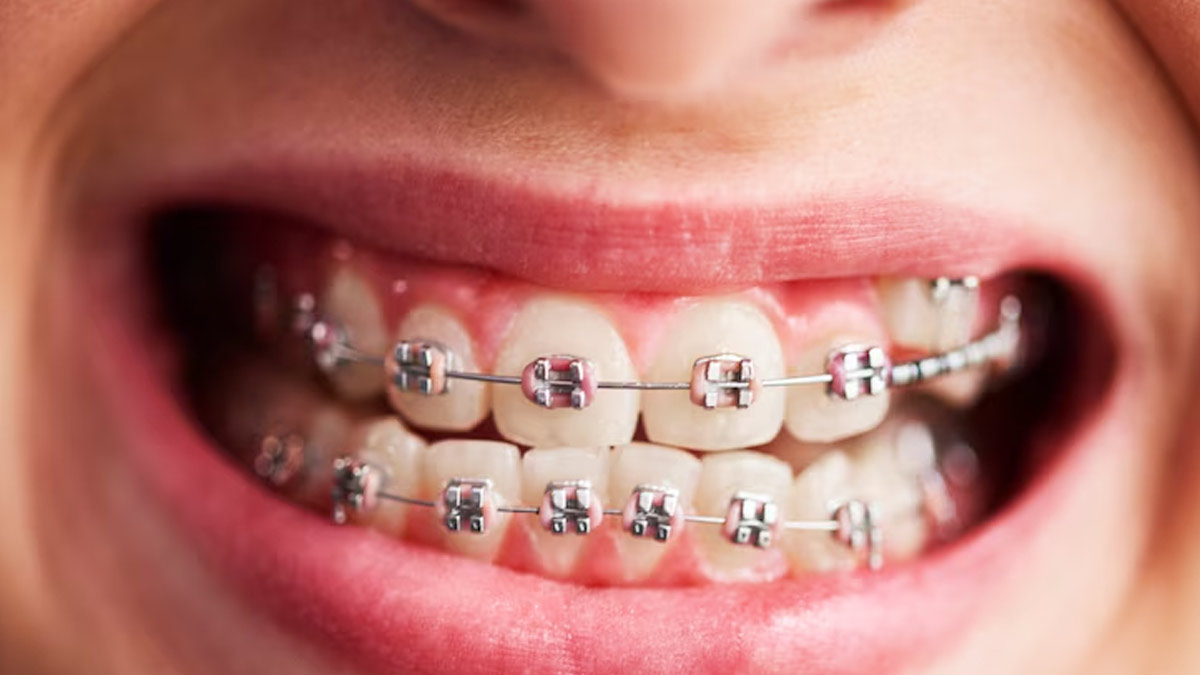
Braces can significantly improve your smile and overall oral health, but they require diligent care to ensure optimal results and prevent oral health issues. Proper care is essential for maintaining the effectiveness of braces and avoiding complications such as tooth decay, gum disease, and bad breath. This article covers practical tips for caring for braces, supported by studies that highlight the importance of good oral hygiene.
Table of Content:-
1. Brushing and Flossing Techniques
Maintaining a rigorous brushing and flossing routine is crucial for individuals with braces. Braces create numerous small spaces where food particles and plaque can become trapped, leading to tooth decay and gum disease. The American Dental Association (ADA) recommends brushing your teeth at least twice a day with a soft-bristled toothbrush and fluoride toothpaste. For those with braces, it’s advisable to brush after every meal to remove any trapped food particles.

Technique: Hold the toothbrush at a 45-degree angle to your gums and use a gentle, circular motion to clean around each bracket. Use an interdental brush (also known as a proxabrush) to clean between the wires and brackets. According to a study published in the European Journal of Dentistry, interdental brushes are more effective in removing plaque in people with braces than regular toothbrushes.
Flossing can be challenging with braces, but it’s essential to clean between the teeth and under the gumline. Special floss threaders or orthodontic floss can help maneuver around brackets and wires. A study from the Journal of Clinical Orthodontics found that patients who floss daily with the help of floss threaders experience less gum inflammation and plaque buildup than those who do not floss regularly.
Also read: Signs Your Child Needs Braces: What Age Is Most Appropriate?
2. Regular Dental Visits

Regular visits to the orthodontist and dentist are vital when you have braces. Orthodontic check-ups are typically scheduled every 4 to 6 weeks, during which your orthodontist will adjust the braces to ensure teeth are moving as planned. Additionally, seeing your dentist for a professional cleaning every six months is crucial for maintaining good oral hygiene.
A study published in the American Journal of Orthodontics and Dentofacial Orthopedics emphasized that regular professional cleanings significantly reduce the risk of white spot lesions—a common side effect of braces caused by plaque accumulation around the brackets.
3. Dietary Considerations

What you eat can directly affect your braces and oral health. Avoid hard, sticky, and sugary foods that can damage the brackets and wires or cause tooth decay. Hard foods like nuts, popcorn, and ice can break brackets, while sticky foods like caramel and chewing gum can get stuck in the wires.
Opt for soft foods that are easy to chew and will not damage your braces. Fruits, vegetables, dairy products, lean proteins, and whole grains are great choices. According to a study in the Journal of the American Dental Association, patients who adhere to dietary guidelines while wearing braces have a lower incidence of bracket breakage and emergency visits.
Also read: Can Braces Cause Teeth Staining, Dentist Answers
4. Use of Mouthguards During Physical Activities
If you are active in sports or physical activities, wearing a mouthguard is essential to protect both your braces and your teeth. A mouthguard acts as a cushion that shields your braces from impact and reduces the risk of damage or injury to your mouth. The American Dental Association advises athletes with braces to use an orthodontic mouthguard, which is specifically designed to fit over braces and accommodate tooth movement.
A study in the Dental Traumatology journal found that the use of custom-fitted mouthguards significantly reduces the risk of dental injuries among orthodontic patients, reinforcing the importance of protective gear during sports.

5. Recognising and Managing Discomfort
It’s common to experience some discomfort when you first get braces or after an adjustment. Orthodontic wax can be applied to the brackets to reduce irritation on the inner cheeks and lips. Over-the-counter pain relievers like ibuprofen can help manage soreness.
A study in the Journal of Orthodontics found that rinsing with warm salt water can effectively reduce gum soreness and inflammation associated with braces. If discomfort persists or if you notice broken brackets or wires, contact your orthodontist for advice.
Conclusion
Proper care for braces is vital to ensure a successful orthodontic treatment journey. By following a thorough oral hygiene routine, visiting your dentist regularly, being mindful of your diet, using protective gear during sports, and managing discomfort effectively, you can protect your braces and maintain optimal oral health. Remember, the effort you put into caring for your braces will pay off in a beautiful and healthy smile that lasts a lifetime.
Also watch this video
How we keep this article up to date:
We work with experts and keep a close eye on the latest in health and wellness. Whenever there is a new research or helpful information, we update our articles with accurate and useful advice.
Current Version